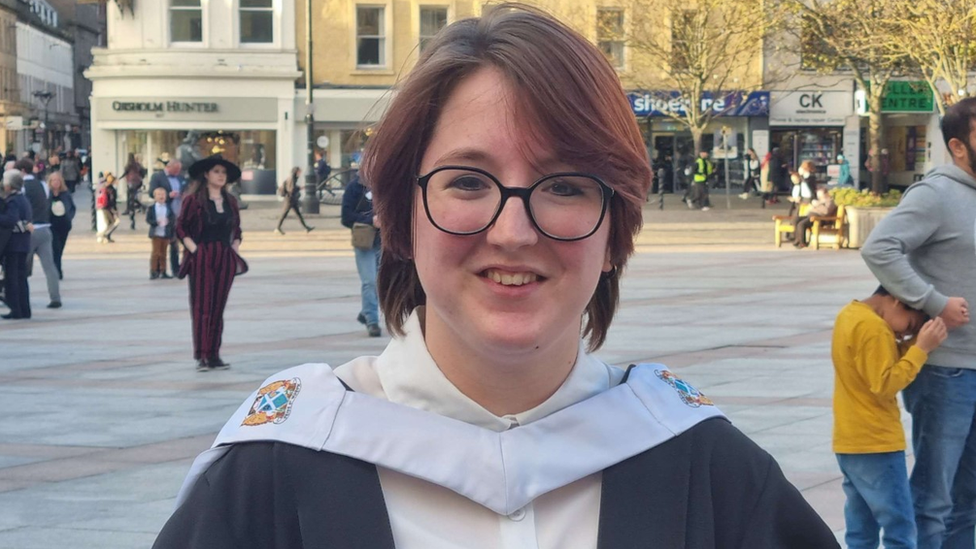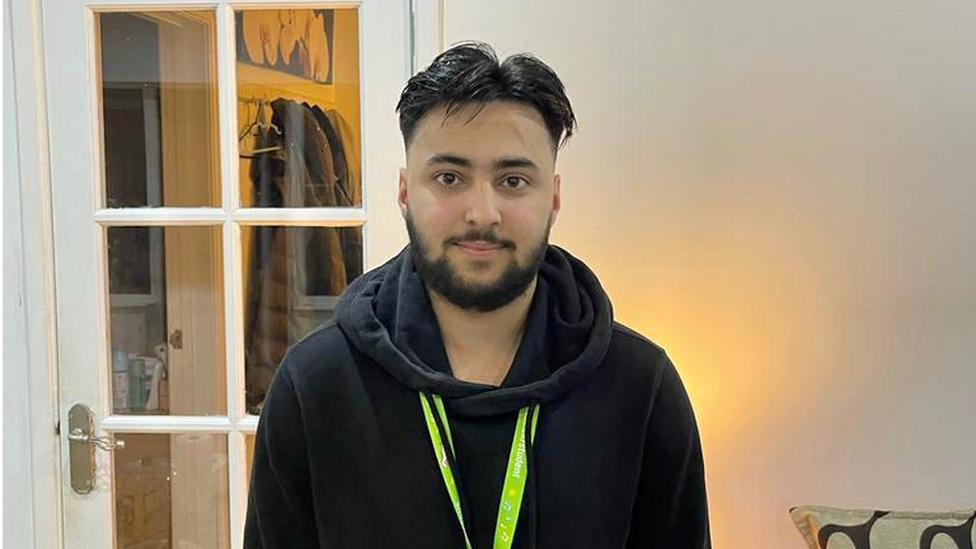'School talked only about care leavers going to prison'
- Published

Student Rosie Campbell says her foster family and social worker were very supportive
Rosie Campbell never imagined she would go to university.
Fostered from the age of 10, she initially tried to apply at 18 but found the process too overwhelming.
"It's just not something I really imagined for myself at all, I thought it was something that was almost too advanced for me to achieve at the time," Rosie says.
Her teachers at school probably knew she was in foster care, she says, but it was mentioned in a negative way only.
"The only time at high school that foster care was brought up, it was to talk about why certain people were statistically more likely to go to prison, which doesn't really help to give kids in foster care much hope for the future," Rosie says.
Unfortunately, her experience is far from unusual.
Just 13% of care leavers enter higher education by their 19th birthday, compared with 45% of the wider population, the government says. It aims to double this.
And last year, 41% of care leavers aged 19-21 were not in education, employment or training, in England, compared with 12% of all young people.
Luckily, Rosie had a supportive foster family, social worker and careers adviser, who all encouraged her to apply.
After taking a foundation course, she is now enjoying her second year studying computer design at Abertay University, in Dundee, but would really like there to be more of an open conversation about coming from a care-experienced background.
"Quite a lot of people don't know anything about being in care - or what they do know is quite stigmatised - so I'm very open to talking about my experiences," Rosie says.
The Universities and Colleges Admissions Service (Ucas) surveyed 500 care-experienced students and analysed hundreds of thousands of university applications.
It found care-experienced applicants were
38% more likely to come from the poorest areas of the UK
twice as likely to be black or of mixed heritage
twice as likely to be disabled
three times as likely to share a mental health condition
79% more likely to identify as LGBT+
'Results day was the best of my life'

Zarak has achieved his dream of becoming a medical student
Deep down, Zarak Khan,18, always knew he wanted to study medicine.
But that became hard to picture when he was taken into care during his GCSEs, a two-hour bus ride from his school.
"I missed out on extracurricular activities like sport and clubs after school because it took so long to get home and I was so young at the time," Zarak says.
"If the school had supported me by providing transport and even mental health support, it would have really helped.
"I thought I was doing well at the time - but looking back, I could have really done with it.
"I always wanted to go to higher education - but being the first person in my family to go to university, I had no guidance. I was a bit clueless."
Zarak has now achieved his dream.
His university, Birmingham, has been incredibly supportive, he says, lowering his entry requirements, giving him a welcome pack when he enrolled and offering mentoring.
"Coming into university knowing I was care experienced, you feel like you're not going to fit in with people who have lived a normal life," Zarak says, "but if you have the right support and the right friends, they can help you - and my university has done that.
"A lot of students want to hide what they are going through - but they need to understand that if you do tell your struggles to the school or university privately, you can get a lot of support and that will help in the long term.
"My experiences, yes they were difficult, but in a way I'm grateful for what I've been through - because it's made me realise it's a privilege to even be in education."
Ucas is recommending the government to share data about which prospective students have been in care - as it does for those who receive free school meals - to help it identify disadvantaged students at the application stage.
It is also recommending universities give conditional offers to applicants who have been in care and meet the minimum entry requirements. This is already the case in Scotland, while the University of Bath will guarantee conditional offers for care leavers from 2023.
"While care-experienced students have high expectations and motivations for higher education, a large proportion have little awareness of the support mechanisms in place that can help their progression, lacking crucial information, advice and guidance to support their decision-making," Ucas chief executive Clare Marchant said.
For 2023 entrants, the Ucas application form includes seven new "widening participation" questions to allow students to flag their individual circumstances, she added.